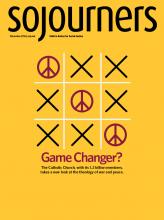TOWARD THE END of August this year, more than 100 million potential U.S. voters were exposed to a fake story about the presidential election that was disguised as hard news. The story, which claimed that Fox News anchor Megyn Kelly had endorsed Hillary Clinton, began on an ultra-Right website called endingthefed.com, but a link to it quickly appeared in the “Trending” box at the top of the Facebook screen. Not only did the fraudulent link slip through Facebook’s legendary screening software, but it stayed there for a full eight hours.
A couple of weeks later, the opposite problem struck when the Facebook robo-censor kicked out posts containing the Pulitzer Prize-winning 1972 photograph of a young naked Vietnamese girl fleeing a U.S. napalm attack. The Facebook Machine didn’t see a gut-wrenching statement about the cruelty of war. It only saw a naked little girl. After an entire day of protests, Facebook finally announced that it would reprogram the software to allow that photo of a naked girl.
Facebook has been cajoled and scolded over the past year by various German officials about the company’s failure to preemptively remove racist material, as German law requires. But Zuckerberg insists Facebook is “a tech company, not a media company.” We build “the tools,” he said, “we do not produce any content.”
The through line in all of these controversies is a persistent question about the role of human decisions versus that of computer algorithms in determining what material appears on Facebook or other digital media intermediaries, including the Google News search engine. Are we just going to see the stories that are generating the most statistically measurable buzz? Or will trained professionals take a hand in guaranteeing that what we see is actually true? The answer has enormous legal consequences for companies such as Facebook. If their human staffs are making choices about the veracity and relative importance of news stories, then digital media platforms may be liable to lawsuits over the content of those stories. But the stakes are even higher for the future of journalism and the functioning of democracy.
Read the Full Article

